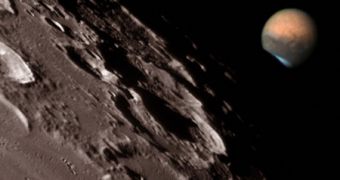NASA chief Mike Griffin stresses the necessity of lunar missions prior to allocating expenses and efforts in order to send people to Mars.
During the recent International Astronautical Congress in Glasgow, Scotland, Griffin spoke of the future mission priorities for NASA, stating that simply because we had already visited the Moon doesn't mean that Mars is necessarily the next destination. There is still far too little knowledge of our planet's satellite to even think of going to its red neighbor. “The total human experience on the Moon is less than 27 human working days - on a world that is the size of Africa. So whether the Moon is a stepping stone to Mars or a place of interest in its own right depends on knowledge we don't have yet,” claimed Griffin.
In order to increase the limits of that knowledge, as well as to test the human and logistics aspects of Mars manned mission projects, NASA's director suggests a complex Moon simulating experiment which would mimic an expedition to Mars by replacing it with the Moon and the Mars spacecraft with the International Space Station.
As Griffin explained in further detail, “The experiment would consist of placing a crew on the space station for say seven or eight months, then taking them from the station and landing them on the Moon and asking them to survive there for nine months to a year, with no further assistance other than what they have brought. After that, return them to the space station for another six or seven months and then back to Earth. All with no extra assistance - because that is what it will be like when we go to Mars. Unless we can do that experiment successfully, the first crew to go to Mars will not come back”.
The NASA chief is backed up in his drastic views by the European Space Agency and China National Space Administration. ESA's general director, Jean-Jacques Dordain, similarly states, “I fully agree with what Mike says. We need to know much more about the Moon and Mars and how humans can use the resources in situ, not launch every kilo of stuff they will ever need. That's why in the meantime a lot of robotic missions to both the Moon and Mars are so very important”.

 14 DAY TRIAL //
14 DAY TRIAL //